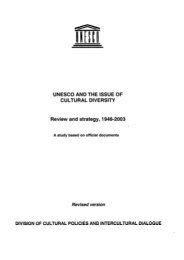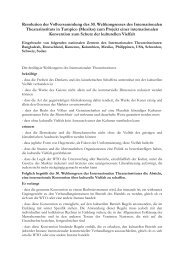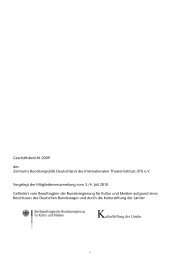Kultur in Gefahr - ITI
Kultur in Gefahr - ITI
Kultur in Gefahr - ITI
You also want an ePaper? Increase the reach of your titles
YUMPU automatically turns print PDFs into web optimized ePapers that Google loves.
14 Artistic Expression <strong>in</strong> a Corporate World<br />
Artistic Expression <strong>in</strong> a Corporate World 15<br />
and social power <strong>in</strong> very few hands.’ (2002: 49). A film, for <strong>in</strong>stance, is not<br />
merely a film anymore. ‘The great profit <strong>in</strong> the media today comes from<br />
tak<strong>in</strong>g a movie or TV show and milk<strong>in</strong>g it for maximum return through sp<strong>in</strong>off<br />
books, CDs, video games, and merchandise. Hence it is virtually<br />
impossible to compete as a “stand-alone” movie studio, TV network, or<br />
music company, when one’s competitors are part of vast empires. This has<br />
fuelled the massive conglomeration rush of the past fifteen years.’ (Ibid.).<br />
Therefore Benjam<strong>in</strong> Barber claims that with ‘a few conglomerates<br />
controll<strong>in</strong>g what is created, who distributes it, where it is shown, and how<br />
it is subsequently licensed for further use, the very idea of a genu<strong>in</strong>ely<br />
competitive market place <strong>in</strong> ideas or images disappears . . .’ (1996: 89).<br />
Besides these super-conglomerates, there are fifty or so second tier<br />
giants that are national or regional powerhouses, like Mexico’s Televisa,<br />
Brazil’s Globo, Argent<strong>in</strong>a’s Clara, Venezuela’s Cisneros Group, and<br />
Berlusconi’s Mediaset <strong>in</strong> Italy. ‘These firms tend to dom<strong>in</strong>ate their own<br />
national markets and media markets, which have been experienc<strong>in</strong>g rapid<br />
consolidation as well. They have extensive ties and jo<strong>in</strong>t-ventures with the<br />
largest media Transnational Corporations, as well as with Wall Street<br />
<strong>in</strong>vestment banks.’ 1 Their political <strong>in</strong>fluence is abundant. Gillian Doyle<br />
remarks that ‘the Berlusconi case provides compell<strong>in</strong>g evidence of a<br />
causal connection between concentrated media ownership and<br />
undesirable narrow<strong>in</strong>g <strong>in</strong> the diversity of political op<strong>in</strong>ions available to the<br />
public via the media.’ (2002: 20).<br />
An <strong>in</strong>terest<strong>in</strong>g question is ‘what ga<strong>in</strong>s arise when media firms<br />
embark on strategies of enlargement and cross-sectoral expansion?’<br />
(Doyle 2002: 45). This is a serious issue, because ‘arguments based<br />
around “economic” concerns have ga<strong>in</strong>ed <strong>in</strong>creased status <strong>in</strong> debates<br />
about media ownership policy <strong>in</strong> recent years. Gillian Doyle judges it<br />
‘important to <strong>in</strong>vestigate what, if any, economic benefits or costs may be<br />
associated with enlarged and diversified firms. One of the worry<strong>in</strong>g<br />
conclusions that emerges from study<strong>in</strong>g recent changes <strong>in</strong> media<br />
ownership policy <strong>in</strong> the UK and across Europe is that relatively little<br />
<strong>in</strong>dependent <strong>in</strong>vestigation or systematic analysis of the consequences of<br />
these changes has been carried out by policy-makers.’ (2002: 172). She<br />
claims, that ‘the general absence of any robust body of <strong>in</strong>dependent<br />
research <strong>in</strong>to the economic implications of deregulat<strong>in</strong>g media ownership<br />
has greatly favoured corporate <strong>in</strong>terests. It has meant that, <strong>in</strong> general,<br />
large media firms’ own <strong>in</strong>terpretations of technological and market<br />
developments, and of the economic implications of these developments,<br />
have been allowed to dom<strong>in</strong>ate the policy agenda <strong>in</strong> the UK and elsewhere<br />
<strong>in</strong> Europe without any attempt at systematic empirical corroboration.’<br />
(2002: 173).<br />
Without any doubt such research would show that cultural<br />
conglomerates are rather <strong>in</strong>efficiently operat<strong>in</strong>g enterprises. Their f<strong>in</strong>ancial<br />
ga<strong>in</strong>s depend upon an extremely limited number of big successes, while<br />
most of what they produce and distribute is loos<strong>in</strong>g even its <strong>in</strong>itial<br />
<strong>in</strong>vestments. They are not merg<strong>in</strong>g endlessly because of their strength,<br />
but it is their f<strong>in</strong>ancial and organisational catastrophic position that drives<br />
them to eat<strong>in</strong>g up even bigger slices of the cultural market. This is a<br />
synergy that has been born out of need, while many banks do hope to see<br />
a return on the <strong>in</strong>vested money.<br />
Will Hutton makes Gillian Doyle’s amazement concrete with an<br />
example. ‘The telecom companies wanted less regulation, they wanted the<br />
right to build their own self-stand<strong>in</strong>g networks and they wanted their<br />
allocations on the terrestrial spectrum to be as free as possible from public<br />
service obligations; long-distance carriers wanted to enter local markets;<br />
all wanted cross-ownership rules relaxed. All that they wanted, they got.’<br />
(2002: 204). And then the dot-com bubble burst, ‘followed <strong>in</strong>evitably by<br />
the end of the telecoms boom – <strong>in</strong> which trillions of dollars were at stake.<br />
We are left with vast overcapacity, threatened bankruptcies and a massive<br />
debt overhang <strong>in</strong> which only a fraction of the capital <strong>in</strong>vested is remotely<br />
recoverable.’ The conclusion of these failed success stories? Will Hutton:<br />
‘And despite it all, no country can boast a complete broadband cable<br />
network. If the public sector <strong>in</strong> the lead<strong>in</strong>g <strong>in</strong>dustrial countries had spent a<br />
fraction of the lost cash <strong>in</strong> each build<strong>in</strong>g one public network, the spread of<br />
the <strong>in</strong>formation economy would have been faster by years. That was<br />
forbidden by the conservative orthodoxy.’ (2002: 206,7).<br />
His observation may help us to be less reserved when <strong>in</strong> chapter 4<br />
we propose regulations <strong>in</strong> favour of the protection and promotion of<br />
cultural diversity. We should take <strong>in</strong>to account that there is no objective<br />
requirement as to why we should have such huge cultural conglomerates<br />
that dom<strong>in</strong>ate nearly all the cultural fields <strong>in</strong> our societies.<br />
1 Robert McChesney, The New Global Media. It’s a Small World of Big<br />
Conglomerates, The Nation, November 1999.










![Geschäftsbericht 2010 [pdf 2 MB] - ITI](https://img.yumpu.com/4380475/1/184x260/geschaftsbericht-2010-pdf-2-mb-iti.jpg?quality=85)